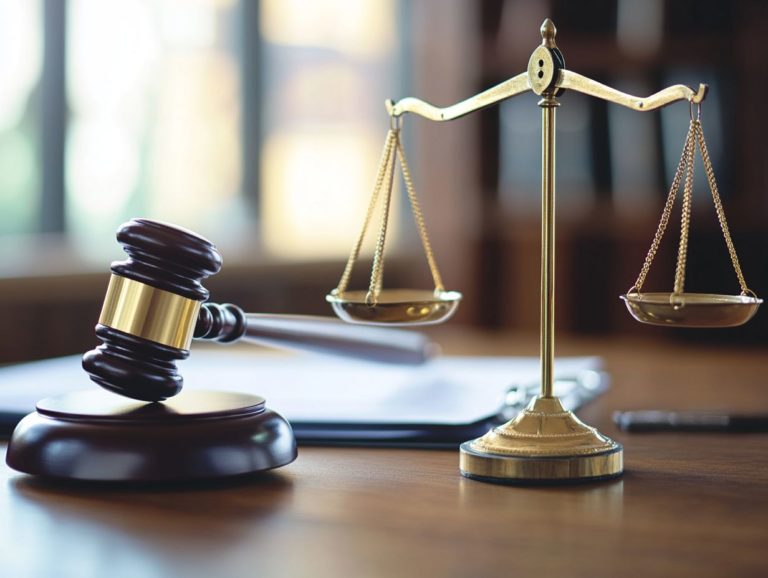Can You Get a Criminal Record Expunged?
Having a criminal record can profoundly influence many facets of your life, from career prospects to personal relationships.
If you’re seeking a fresh start, understanding the process of criminal record expungement is vital. This article will explain what expungement entails, the eligibility criteria, and the specific steps involved in the process.
It will also cover the benefits of expungement and discuss alternatives for clearing your record. Whether you re weighing your options or aiming to reclaim your future, this information is indispensable.
Contents
- Key Takeaways:
- Understanding Criminal Record Expungement
- Eligibility for Expungement
- The Process of Expungement
- Benefits of Expungement
- Alternatives to Expungement
- Frequently Asked Questions
- Can You Get a Criminal Record Expunged?
- What is the process of getting a criminal record expunged?
- Who is eligible to get a criminal record expunged?
- How long does it take to get a criminal record expunged?
- Will an expungement completely erase my criminal record?
- Can I still get a job with a criminal record even after it has been expunged?
Key Takeaways:
- Expungement allows individuals to have certain criminal records removed from public view.
- Eligibility for expungement varies depending on the jurisdiction and the severity of the offense.
- Expungement can positively impact employment opportunities and personal well-being.
- Other options may also be available for clearing your record.

Understanding Criminal Record Expungement
Understanding criminal record expungement requires knowledge of the criminal justice system and the specific laws that shape the process in Iowa. Expungement is a legal procedure that allows you to erase certain criminal convictions from your public records.
This can enhance your chances of securing employment and improve access to housing and public assistance programs. This process is especially important for families of color, who often face significant socio-economic challenges due to persistent criminal records.
The Clean Slate Initiative aims to streamline this process, offering a fair opportunity for those striving for redemption and reintegration into society.
What is Expungement?
Expungement is a legal process that enables you to have certain criminal charges or convictions removed from your record, sealing it from public view. This can significantly transform your life, reopening doors that may have previously been closed due to past mistakes.
There are various forms of expungement. For instance, automatic expungement occurs without you needing to take any extra steps, often applicable in specific situations like non-violent offenses after a designated period. Sealing procedures typically require you to file a formal petition with the court, helping to lessen the stigma associated with your past encounters with the law.
Understanding these different options not only brings clarity but also helps you effectively navigate your rights, potentially leading to a more hopeful and promising future.
Eligibility for Expungement
Eligibility for expungement in Iowa can be intricate, depending on specific factors such as the nature of your criminal convictions, the time that has passed since a misdemeanor conviction, and whether you have successfully completed a deferred judgment or a rehabilitation program.
Understanding these requirements is crucial for anyone looking to clear their record and eliminate employment hurdles resulting from their past criminal history.
Criteria for Expungement

The criteria for expungement under Iowa Code include various factors, such as the nature of your criminal history, the completion of your sentences, and whether you have been charged with any subsequent offenses.
For example, the rules for expunging a non-violent misdemeanor differ from those associated with a felony conviction. If you have completed all court-imposed requirements, such as probation or community service, you might be eligible to have your records sealed provided you haven’t reoffended.
Navigating these complexities often requires expert legal guidance. Criminal defense attorneys are invaluable for assessing your case, ensuring that all necessary documentation is prepared accurately, and advocating on your behalf during expungement hearings.
This support significantly increases your chances of achieving a successful outcome.
Take control of your future today contact an attorney to start your expungement journey!
The Process of Expungement
The process of expungement usually unfolds in several key steps, starting with gathering the necessary documents, filing for a court order, and attending a hearing.
Navigating these complexities often requires legal assistance, which can feel overwhelming at times. Be aware that legal and administrative fees may present additional challenges along the way.
However, gaining a clear understanding of each step can significantly enhance your chances of achieving a successful outcome.
Steps to Expungement
The steps to expungement typically involve consulting with a skilled criminal defense attorney. You also need to gather necessary documentation, submit a petition to the relevant criminal justice agencies, and attend a court hearing to present your case.
Understand each of these stages. This will help you navigate the complex landscape of clearing your record. Start by reaching out to a qualified criminal defense attorney, who can offer invaluable insights into your specific situation and the details of Iowa law.
Collecting the necessary documentation can be challenging. You might find it hard to obtain past court records or police reports. Establishing communication with local law enforcement or the clerk of the court early on is a wise move.
Once you ve gathered the required paperwork, be prepared for the petition submission to undergo scrutiny from various criminal justice agencies, potentially leading to delays. To navigate these challenges effectively, consider consulting legal aid services that can provide guidance and support.
During the court hearing, being well-prepared and understanding possible objections from the prosecution will be critical. Addressing these concerns directly can significantly enhance your chances of a favorable outcome.
Benefits of Expungement
The benefits of clearing your record reach far beyond the individual, creating a ripple effect that enhances families and communities.
Expungement improves access to jobs. This not only benefits families but also strengthens the economy by reintegrating individuals into society free from the weight of criminal convictions.
Embracing expungement can elevate quality of life and diminish reliance on public assistance programs, fostering a healthier, more productive community for everyone.
Impact on Employment and Personal Life

The impact of clearing your record on your employment and personal life is truly transformative. It removes significant barriers that individuals with criminal records often face, enhancing your socio-economic status and enabling you to contribute positively to your community.
By clearing your record, you place yourself in a stronger position to secure jobs. Many employers conduct background checks, and a criminal history can be a major deterrent. For example, consider the case of a former offender who, after receiving expungement, successfully landed a job in the construction industry an opportunity that previously felt unattainable.
Clearing your record boosts your confidence and stability. It enables you to pursue housing opportunities that were once out of reach. This clears the way for a brighter future for you and your family!
Alternatives to Expungement
Expungement is a valuable option for clearing a criminal record. However, consider exploring other alternatives available to you.
These include sealing procedures for non-guilty verdicts, as well as accessing rehabilitation resources designed to support you in overcoming past criminal charges.
Explore your options today and take control of your future!
Other Options for Clearing Your Record
There are other ways to clear your record. You can seek legal advice, apply for a Governor’s Pardon, or explore community support initiatives.
These options are crucial for anyone looking to rehabilitate their image. Legal professionals can guide you based on your situation.
If you re considering a Governor’s Pardon, be ready for an in-depth application process. This could include public hearings, but the relief it offers is worth it!
Community programs provide valuable workshops. They help you connect while assisting with the process of removing a criminal record from public view.
Navigating these options can be challenging due to paperwork and varying state laws. Make informed choices to avoid setbacks!
Frequently Asked Questions
Can You Get a Criminal Record Expunged?

Yes! It is possible to get a criminal record expunged in certain circumstances. The specific eligibility requirements and processes may vary depending on the state and type of offense.
What is the process of getting a criminal record expunged?
The process of getting a criminal record expunged typically involves filing a petition, attending a hearing, and showing that you meet the eligibility requirements. It s advisable to seek help from a lawyer to navigate this complex legal process.
Who is eligible to get a criminal record expunged?
Eligibility for expungement varies by state and type of offense. Generally, first-time offenders, juvenile offenders, and those convicted of minor offenses have a higher chance of clearing their record. Some states have specific programs for non-violent and low-level drug offenses.
How long does it take to get a criminal record expunged?
The timeline for getting a criminal record expunged can vary. It can take anywhere from a few months to a year, depending on the court s schedule and the complexity of the case. Start the application process today to boost your chances of success!
Will an expungement completely erase my criminal record?
An expungement does not completely erase your record. It removes the record from public view, but it may still be accessible to government agencies and certain employers. The record may still impact certain legal proceedings.
Can I still get a job with a criminal record even after it has been expunged?
Yes! It is possible to get a job with a criminal record, even if it has been expunged. However, be honest with potential employers, as they may still have access to your past records. Some employers may be more forgiving of past mistakes.
Clearing your record is a vital step toward a fresh start! Take the necessary steps today to improve your future.






